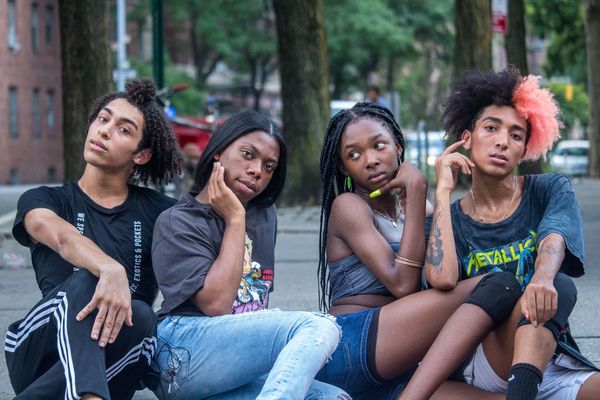 |
| Ivy Rose, Candy, Nelle and Aphrodite in BLACK AS U R Photo: Yinka Parris |
It’s not so many years ago that festivals like Newfest didn’t exist, or if they did, they were small and secretive. Queer cinema has fought for a place on the map and yet, although Black people have played pivotal roles in making that happen, there are still very few films addressing Black LGBTQ+ experiences. In particular, there’s a shortage of work addressing the intersectional issues faced by people in those communities, or asking why African American people still find it much harder to come out of the closet and find acceptance than is now the case for their white peers. Micheal Rice’s BLACK AS U R, which is screening as part of the aforementioned New York festival, attempts to fill that gap. It’s a strong piece of work which addresses the problem from the ground up, talking to community members and to some of those still resistant to making room for them.
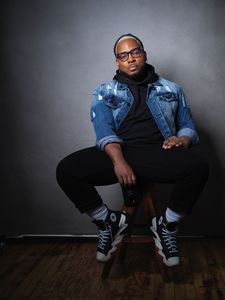 |
| Micheal Rice Photo: Francais Hill |
It comes, says Rice, from a very personal place, inspired by a violent incident which took place in a grocery store in Minneapolis on the 1st of June, 2020.
“During the time of Covid, I was pretty much stuck at home, and I saw a lot of images of black bodies. through the lens of state violence with police. It really stirred something within me to, to want to be a part of something bigger, to be an advocate, to be an activist, and to do something about it. So I decided myself to go on the streets of Brooklyn where I live, and start protesting, and then all of a sudden, I saw the beating up of a young trans teen, Iyanna Dior, and from seeing her experience, I started posting about what I saw. It went viral and I started getting a lot of pushback from people in my own community, because the individual was a trans woman.
“At this time, I'm protesting and fighting for Black Lives Matter, but it posed the question, ‘Whose Black lives matter? When that happened, I felt that as a Black queer man, that I need to do something about it. And so I decided to create the documentary called BLACK AS U R, because I wanted to turn the mirror on my own community when it comes to the subject of homophobia and transphobia.”
It seems very timely, I say, because there have been so many killings of black trans women, sadly, over the past couple of years. Did he see that developing while making this?
“Yes, I did,” he says. “And so immediately, right after the situation with Iyanna Dior, there was a Black trans woman named Dominique Rem’mie Fells, who's also a part of the documentary – we were able to capture recent footage of her – and she was brutally murdered. And it was very, very disheartening. I wanted to add that piece into the documentary because I thought that it was incredibly important. I mean, she was one of the people who helped reignite Black Trans Lives Matter and I wanted to put a story out there so the world can see what this young trans woman went through and how her story ended, so it can kind of be like a learning curve for others, and to also motivate activists and others to really put value towards everybody's lives, and especially those that are Black and those that are trans.”
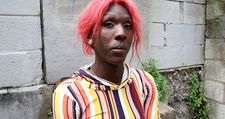 |
| Dominique Rem'mie Fells, murdered in Philadelphia in 2020 Photo: Mal Lewis |
He speaks to a lot of different people over the course of the film, often directly after meeting them in the street. Despite what was happening, he says, he didn’t have difficulty winning their trust. He was very straightforward about it.
“When it came to interviewing people I let them know like, ‘Hey, my name is Micheal. I'm a filmmaker, and being a part of this community, I want to tell our story, especially deriving from a black person within the LGBTQ community.’ I felt that it was incredibly important. I met them where they were at, and from there I just decided to tell their stories and be very open about about the whole situation. I wanted to tell them honestly. I wanted to be transparent about who they are, what they are, and the experiences that they're going through.
“When it came to Dominique, the footage that we had of her already existed, from the young man in the film named Mal Lewis, who was actually accidentally recording when he was trying to figure out his camera. He ended up recording Dominique walking across in front of his storefront. He accidentally left the camera on that day, and it was continuing to roll. So we found that way down the line, but it was interesting, we were able to capture that footage and use that footage. But when it came to everybody else, everyone was very open in telling their stories. They wanted to tell their stories, and they wanted them to come from their spirit, from their heart.”
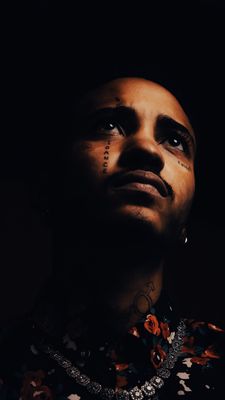 |
| Palmer, a trans man Photo: Yinka Parris |
We talk about the problem, in the African American community, of being seen as imitating white people or otherwise letting the side down by being LGBTQ, and he brings up a scene in which he visits a barbershop and invites the men their to discuss their attitudes to the subject. That’s a hyper-masculine environment, he stresses.
“I myself was actually kind of nervous because it's always been a fear of mine, growing up in the Black community, to be outed either in church or in the barbershop. Because those are like the epicentres of Black culture in America, you know? The barbershop, the beauty shop, the church, places like that. And so I was always had that fear, but it never happened. But I think internally, it always stayed with me. So then as a producer, and director, when I was actually shooting the scene, and going into the barbershop, it was all very organic, it was very raw. None of it was staged, and nothing was pre-planned.
“The owner told us just to come in for one hour, and that we have to leave after we interview because they have to continue on with business. So literally, whoever was in that shop, was literally in that shop to get their hair cut, and that was it. And so all those interviews you see, even some of the ones that don't seem so polite – and some of them seem very ignorant – all that was organic, it was real, and they didn't want to cover up anything, they wanted to tell exactly how they felt. And I thought that was helpful, because this shows how inner conversations within silos like that take place when they're talking about subjects of LGBTQ. And so it was just” – he hesitates – “it was a lot.”
We talk about masculinity, its particular importance to men who face marginalisation, and the way that LGBTQ people are sometimes seen as a threat to it.
“If you look at the social status of a lot of heterosexual Black men in America, they seem to be very hyper-masculine,” he says. “I mean, even if you take it to rap music, you know, in that culture, everything is hyper-masculine. And then we start having conversations about things that are queer or LGBTQ. For some people, it feels like now you're threatening the masculinity in their protective cover, and if you dismantle it, they don't know how to perceive it or go about engaging with it.
“What I want to do is break down the walls that we have built up in this patriarchal structure, to have conversations about what does it look like to have friends or family members that are LGBTQ, or that are queer or that are trans? Creating normalcy around the conversation, to create a safe haven for people to speak freely. And if you create spaces to speak freely, then you start seeing all these interconnections and intersectionality come into play, because now people are relating to one another and saying ‘I have someone in my family that is trans. I have someone in my family that is a lesbian, that is gay, that is queer, that is questioning, that is non-binary. So now when we open up these spaces, we can have more dialogue. And once we have these dialogues, you'd be surprised how open people will be. So that's what I wanted BLACK AS U R to do, is create spaces so we can have these conversations.”
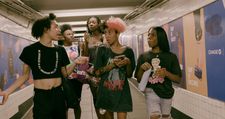 |
| Ivy Rose, Spicy, Nelle, Aphrodite and Candy walking in NYC Greenwich Village Subway in 2020 Photo: Yinka Parris |
There have also, for a long time, been very limited ideas about what is permissible within Christianity. Is that starting to change?
“I personally feel like it's something that's starting to break down,” he says, “because people are starting to put themselves first and their loved ones and their families. But it's still a big ordeal. I mean, if you look at the Christian religion within America, for the Black community, it has been the staple of how we've been able to survive. So to try to eradicate parts of it, for certain people, is very difficult. But I think with having social media now, people being educated now, people are having more conversations about transphobia, queerphobia, things of this nature. I think parents and grandparents and uncles and aunts are really starting to see that what comes first is love.
“That's what I really feel l want to come across, is love. You know – how could you disown something that was created by a higher source? I'm a Christian and I believe that all of God's creatures are beautiful and made in a way that He wanted them to be made. I grew up in the church, I still have beliefs in the church. But I'm not going to believe that God thinks I'm an abomination. I'm not going to believe that I can’t have a personal relationship with that higher source. I just refuse to believe it, because God, for me, is about love, and if you call yourself a Christian, you lead with love, and lead with acceptance, period.”
I ask how making the film has affected him on a personal level.
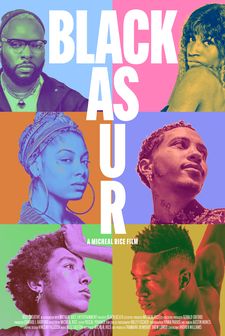 |
| BLACK AS U R poster |
“It’s affected me in a way where, right now, I'm super joyous,” he says. “I'm travelling all over the world with the film. I'm actually in Wisconsin, I just flew here. And we have some of the people who were in the film, I call them the Village kids, we actually had some of them flying in today, and some of them had never been out of New York, you know? I love it, because now they're starting to see the country, they’re going to start seeing the world, from this film, and telling their stories. And that's what makes me feel elated. That's what makes me feel joy inside is because I'm exposing people's stories to the world.
“We're also creating these dialogues about queerisms, you know? Especially being a person of colour, being a Black queer man. And Anthony in the movie, who now goes by Aphrodite, who has transitioned with her pronouns being she and her, she’s coming here today so we can speak at a university, and the young people at the university are so excited to meet her, because they've seen the movie and they want to have conversations about, you know. What is it like to be to start off as a non-binary individual and then transition to being a trans woman? These are the conversations we need to have. And in certain places like Wisconsin, which is more of a rural area of the United States, it's not really being had.
“I'm excited about the film because I feel like what was in my heart is actually changing the world. I cried the first time I've seen the completion of my film. As a filmmaker, you know, you're so busy creating and making sure all the technical stuff is taken care of, and when you finally finish, you just kind of sit back and watch. It was fine, because I was like, ‘Wow, that was actually in my mind!’ I actually curated it with a bunch of other teammates in production and post production, and look, we created this beautiful piece of work that I've never seen before. As a black queer man, I've never seen a piece of a documentary that explained black queer culture in this aspect, where you not only have history, but you have aspects of academia and you have objective storytelling from the very people that it affects. So far it's been six months, and I've been nonstop on the road. This is great.”





















